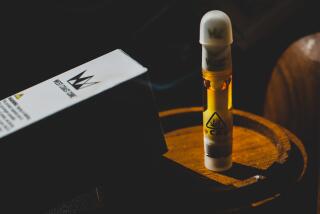Firm Seeks Approval to Sell Single Cigarettes
- Share via
SACRAMENTO — In what could become a new tobacco marketing effort, a Phoenix firm is seeking approval to sell single-cigarette packs in California, prompting anti-smoking advocates to accuse the firm of targeting young people who can’t afford $2.50 for a full 20-cigarette pack.
The plan surfaced Thursday in an unusual spot--with state taxing authorities. A firm called Single Stick Inc. has asked the State Board of Equalization to approve a new method for taxing its product, thus permitting its sale in California.
Although the staff had recommended the approval of the new system for taxing the product, the board--led by member Brad Sherman of Los Angeles--deferred a decision on the proposal.
But the issue is not dead and could come back before the board as early as next month.
“I join the vast majority of Californians in denying any use of taxpayer funds to recruit even one more teenage smoker,” Sherman said, citing estimates that the new taxation system would cost the state $50,000 to administer.
Initially, the board deadlocked 2 to 2 on the question of approving the new tax system. But after a lunch break, the board returned and sent the proposal back to its staff for further study.
“Obviously, they’re going to market [the product] to children because they’d be cheaper,” board member Dean Andal said, siding with Sherman.
Although state and federal laws prohibit stores from selling loose cigarettes, there is no specific prohibition on selling packages of one or a few cigarettes.
Tax laws, however, make such sales uneconomical. Only one firm sells single-cigarette packs in California, but those are specialty items such as clove cigarettes that sell for roughly 80 cents apiece.
The specific issue at hand Thursday involved tax stamps. Cigarette makers must display the stamps on their packages as proof that they have paid their state tobacco taxes.
The state, however, offers no tax stamp for packs of fewer than 10 cigarettes, prompting the Single Stick request for a new stamp or method of taxation.
Making it more difficult for a cigarette distributor or manufacturer who wants to sell one- or two-cigarette packs, state law requires that manufacturers who want to sell small packs must pay taxes as if they were selling 10-cigarette packs, which are taxed 18.5 cents, and then seek a refund from the state for the extra taxes.
Single Stick attorney James A. Deer had requested in a June 27 letter that the board consider a new method of taxation for its product, and sought an expedited decision.
The firm’s representatives did not address the board, and Deer failed to respond Thursday to several calls from The Times about the proposal.
Single Stick is represented by influential Sacramento lobbyist Donald Brown, who could not be reached.
“It looks like they want to test-market,” said Paul Knepprath of the American Lung Assn., noting that the staff report suggests that the firm believes it could sell 12 million cigarettes annually.
“It makes it less costly to become addicted to tobacco,” Knepprath said. “People who would purchase them are kids and people with lower income. One deterrent for kids [now] is the financial commitment.”
Sherman and others predicted that if Single Stick succeeds in its effort, large tobacco companies might start selling cigarettes in packs of fewer than 10.
The Phoenix firm’s effort does not appear to be part of a broad tobacco industry marketing plan. A Sacramento representative of tobacco giant Philip Morris said he was unaware of any such effort, and not familiar with Single Stick.
More to Read
Get the L.A. Times Politics newsletter
Deeply reported insights into legislation, politics and policy from Sacramento, Washington and beyond. In your inbox twice per week.
You may occasionally receive promotional content from the Los Angeles Times.










